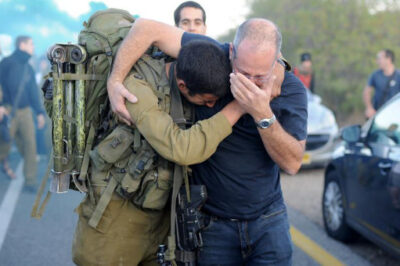The terror attack in Boston shocked the American people to the core, reminding them that the previous attacks on 9/11 and the subsequent attack at Ft. Hood were not isolated incidents. Could it be that the attack in Boston is the continuation of a frightening pattern that needs to be confronted?
The nation of Israel has been struggling with such terrorist attacks for decades, at a frequency and proportion that would horrify any free country. Yet despite the pain and human suffering that comes from such terrorism, there are many key lessons to be learned—and therefore, Israel can teach the United States some fundamental strategies to counter terrorism and its effects. These lessons can be explained and understood on three levels.
1. Individual. The trauma of terrorism is deep. After a terror attack, the discussion tends to be about the physical wounds, but the psychological wounds are much deeper, and often are noticed only much later, especially in children. The trauma of terrorism reveals itself in a variety of symptoms, including fear of sleep, exaggerated aggression towards other children and separation anxiety.
Parents should explore the possibility of treatment for their children if these symptoms emerge. The therapeutic programs supported by the Shiloh Israel Children’s Fund in the heartland of Israel use music, art, animals, horses and multisensory safe-room therapies to heal the trauma of terrorism. The vast experience gained from these treatments can be applied to American trauma victims as well.
2. Public. The response of the general public to the trauma of terrorism is critical. Israelis are a resilient people. When there are terror attacks in Israel, people continue to go to work, attend school and have their leisure and vacation time. Yes, extra safety precautions are taken.
I remember on my first visit to Israel over twenty-five years ago, I visited a department store in Jerusalem. As I entered, a security guard stopped me to check my bag as I entered. Growing up in New York, bags were checked as we left the store, but in Israel the concern about shoplifting was minimal, while the threat of terrorist bombings was very real. The safety precautions are accepted lovingly, but we continue to live our lives to the fullest. If we don’t, the terrorists have won.
3. Political leadership. Unlike the current leadership in the U.S., which consciously avoids the term “Islamic terrorism” as unfairly singling out one religious group, most of the political leadership in Israel has always understood that “jihad,” or holy war, against non-Muslims is central in the Islamic psyche. Of course, not all Muslims engage in terrorism, but the potential for such activity is that much greater with that group.
Furthermore, Israeli authorities are always cognizant of formal and informal cooperation between Islamic terrorist groups. These understandings strengthen our strategies as well as our resolve in combating this evil. An excellent example is Israel’s airline security, in which common-sense profiling is a central element, even before passengers reach the airport. Shouldn’t a 22-year-old Muslim who has visited Pakistan be subjected to a much more rigorous security check than a five-generation American grandmother from Kansas?
There is also a lesson to be gained from the world of sports. The best defense is a good offense. We have seen that when the Israeli government is on the offensive, aggressively hunting out terrorists and their weapons in the Palestinian Authority’s autonomous areas, terrorism decreases.
Rather than a scrambling, haphazard approach to battling Islamic terrorism, implementation of the three-level approach I have outlined above can strengthen the families, the general public and the law-enforcement authorities in the U.S., as well as in the entire free world. Any delay in doing so is simply irresponsible and will lead to more unnecessary loss of lives.
David Rubin, former mayor of Shiloh, Israel, is founder and president of the Shiloh Israel Children’s Fund, www.ShilohIsraelChildren.org, established after he and his 3-year-old son were wounded in a terrorist shooting attack. He is the author of three books, including his new book, Peace for Peace: Israel in the New Middle East, available on Amazon.com or at www.DavidRubinIsrael.com.







Leave a Comment
You must be logged in to post a comment.